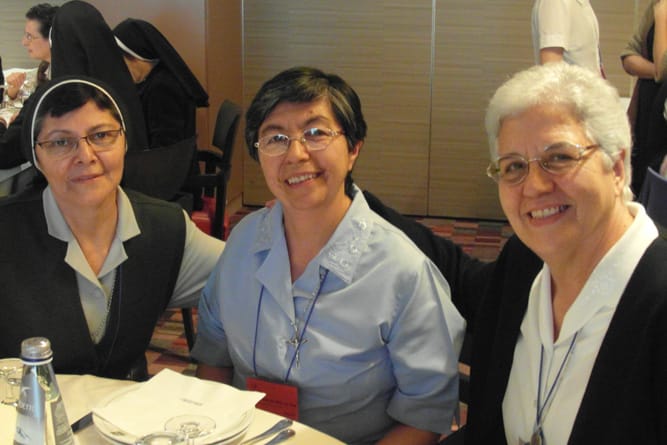P. – Sister Mayrian, What did such a big number of Superiors General together do in Rome? R/. – It was the General Assembly of the (UISG). The UISG is the International Union of Superiors General, which carries out a plenary assembly every three years in Rome, with the purpose of reflecting together on topic chosen and prepared in advance from the concerns, previously gathered from the 1972 superiors general registered in the organization.
P.- What was the topic of this year?
R/. The topic was: It will not be so among you” (Mt. 20:26). The service of leadership according to the Gospel.” On the one hand, it is in complete conformity with the Gospel, but very actual on the other hand, because we asked ourselves how would authority be exercised in the times in which we live. Moreover, it moved on different levels. It wanted above all to indicate the course that the superiors general must follow. But at the same time, as by extension, the superiors of a Province, of a Delegation or Region; and even the very local superior.
Six Languages
P/. How did the assembly evolve?
R/. It started in the 3rd of May with the welcoming of the superiors general who attended for the first time, with the presentation of the organization of UISG and the registration. In the afternoon the formal opening was done with the opening remarks of the President, the presentation of the program and the introduction of the delegates by tables.
We, the 820 participants, were assigned to work tables consisting of ten persons each and grouped according to language. Each table was provided with a simultaneous translation in six languages.
Each day started and ended with a brief moment of prayer, the starting prayer lasted half an hour, while that of the afternoon a little bit shorter. The topics, chosen according to the theme of the day, already indicate the progress of the Assembly: “Listen, Purification, Discernment, Communion and Mission”. The songs were done in different languages, with refrains that were easy to follow even without knowing the language.
P.- Was there participation? Did you have the chance to intervene?
 Superiors General in the table 46 R – Along the course of the meeting a climate of sorority and closeness was being built thanks to the interventions that were made after each conference, in response to the questions posed either by the speaker or the moderator of the day. And, at the end of the Assembly, each table also presented a list of criteria, ideas, intuitions that it considered important as orientations for the mission during the years 2013-2016. Certainly, there was participation, and a very enriching one, because of the possibility of sharing with such a variety of congregations, of listening to the reality of the female religious life, of knowing the attempts and experiences that are being done in trying to respond to the new challenges.
Superiors General in the table 46 R – Along the course of the meeting a climate of sorority and closeness was being built thanks to the interventions that were made after each conference, in response to the questions posed either by the speaker or the moderator of the day. And, at the end of the Assembly, each table also presented a list of criteria, ideas, intuitions that it considered important as orientations for the mission during the years 2013-2016. Certainly, there was participation, and a very enriching one, because of the possibility of sharing with such a variety of congregations, of listening to the reality of the female religious life, of knowing the attempts and experiences that are being done in trying to respond to the new challenges.
P. – The Cardinal Prefect of the Vatican Congregation also intervened. What do you think?
R/. The participation of the Cardinal Prefect, João Braz de Aviz could be measured by the way he responded to the questions formulated by the Assembly through the work tables. It was close and fraternal not only by his manner of reacting to attitudes and standards, but also by clearly manifesting his emotions in doing it. He underlined the closeness of the Pope to, and his confidence on, the people with whom he works.
Joy with the Pope
P.- And what do you say about the audience you had, for you alone, with Pope Francis? Was it noticeable that he is also a religious?
We looked forward to the audience with the Pope with great excitement, since they were to be his first words to the religious life and, more specifically, to women religious. He was received in the middle of applause and we all listened very attentively to his allocution. He explained very clearly the principle that gives solidity to vocation, which is no other than the call of the Lord. But at the same time, he also insisted on the need to respond with worship and service to Him in the brother and sister.
He sent very special greeting to all the Sisters of the Institutes represented there, and in a very special way, to the sick and the young. In a conversational and apologizing manner, he told us that we should be mothers and not old maids, to which the entire audience responded with a laugh, understanding what he wanted to say. And he did not fail to throw a compliment to all the religious: ‘What would happen to the Church without you.’
P.- What is your final assessment of the Assembly?
R. – On a personal level, I can say that the Assembly has been a gift adorned with many other gifts. A gift for me, for the experiences in life; but, at the same time, I also hope that it be for our congregation MAR in the measure that we live with enthusiasm and maturity our consecration, our relationships and, therefore, our service. I refer to human maturity that goes hand in hand with maturity on the level of the Gospel.
The topics that come one after the other left me, on one hand, with the desire to continue in search for ways that may respond to the needs of today, because their needs are the indicators of the place where we should be present and perform our missions. They also left me with the concern to be able to share effectively the theme with all our Sisters, trying hard together with them, to make ourselves more humble, more simple, and of doing more service to other, because this is what Jesus taught with His life and left us as heritage.


